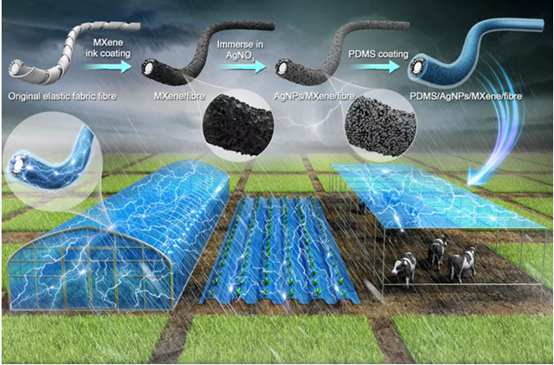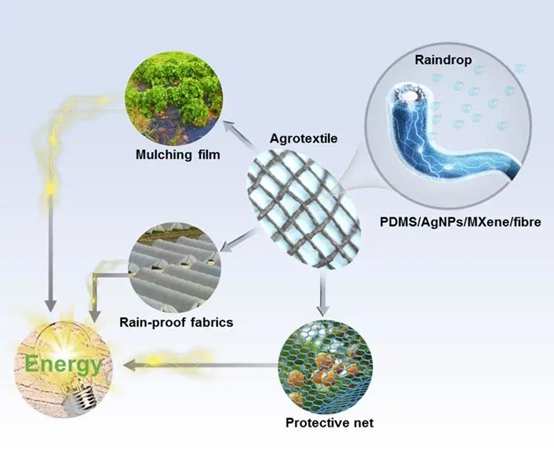

By combining triboelectric nanogenerator (TENG) with textile used in agriculture, kinetic energy of raindrops can be converted into electric energy, suggested the latest findings of a research team of Zhejiang University in east China’s Zhejiang province, a WeChat account of Xinhua News Agency reported on June 6.

The production of TENG yarn and its application scenarios in agriculture.
Researchers of College of Biosystems Engineering and Food Science, Zhejiang University, tactfully integrated TENG into agrotextile, developing a TENG yarn that can produce electricity in rain.
After being connected to energy storage equipment, the transformed agrotextile can continuously transmit power to Internet of Things (IoT) sensing devices in the future, thus realizing wireless and battery-free monitoring of agricultural information and providing information about weather conditions in a real-time manner, said Ping Jianfeng, member of the Zhejiang University research team.

Application of the TENG yarn in agrotextile.
The final development of triboelectric yarn (diameter of ~400 μm) has been proven to possess extraordinary output performance, generating a voltage of 7.7 V with an effective contact length of 3 cm, according to the research results recently published in multidisciplinary journal Nano Energy.
Parameters like ambient temperature and relative humidity, illumination intensity, moisture, salinity and alkalinity, as well as physical indicators of crops, are all closely related to the growth of crops, and real-time monitoring of these variables in smart agricultural systems requires electric drive, explained Ping Jianfeng.

Schematic diagram of TENG yarn collecting raindrops.
More often than not, it’s difficult to lay conduits in the fields, and batteries usually have limited life and pose pollution risks, so the development of battery-free and wireless systems for agricultural information sensing is a major trend in smart agriculture, Ping noted.
 Fire brigade in Shanghai holds group wedding
Fire brigade in Shanghai holds group wedding Tourists enjoy ice sculptures in Datan Town, north China
Tourists enjoy ice sculptures in Datan Town, north China Sunset scenery of Dayan Pagoda in Xi'an
Sunset scenery of Dayan Pagoda in Xi'an Tourists have fun at scenic spot in Nanlong Town, NW China
Tourists have fun at scenic spot in Nanlong Town, NW China Harbin attracts tourists by making best use of ice in winter
Harbin attracts tourists by making best use of ice in winter In pics: FIS Alpine Ski Women's World Cup Slalom
In pics: FIS Alpine Ski Women's World Cup Slalom Black-necked cranes rest at reservoir in Lhunzhub County, Lhasa
Black-necked cranes rest at reservoir in Lhunzhub County, Lhasa China's FAST telescope will be available to foreign scientists in April
China's FAST telescope will be available to foreign scientists in April "She power" plays indispensable role in poverty alleviation
"She power" plays indispensable role in poverty alleviation Top 10 world news events of People's Daily in 2020
Top 10 world news events of People's Daily in 2020 Top 10 China news events of People's Daily in 2020
Top 10 China news events of People's Daily in 2020 Top 10 media buzzwords of 2020
Top 10 media buzzwords of 2020 Year-ender:10 major tourism stories of 2020
Year-ender:10 major tourism stories of 2020 No interference in Venezuelan issues
No interference in Venezuelan issues
 Biz prepares for trade spat
Biz prepares for trade spat
 Broadcasting Continent
Broadcasting Continent Australia wins Chinese CEOs as US loses
Australia wins Chinese CEOs as US loses